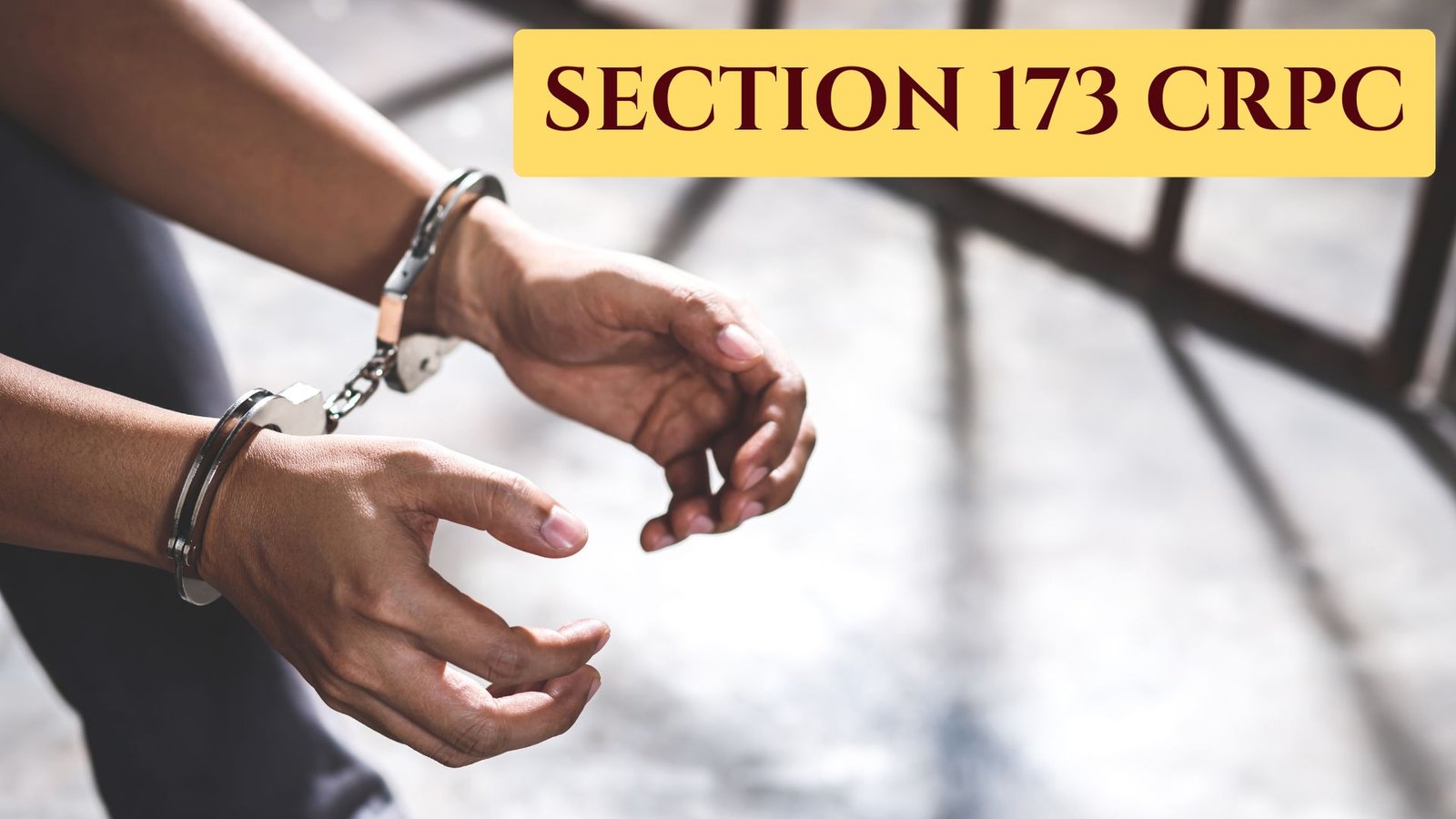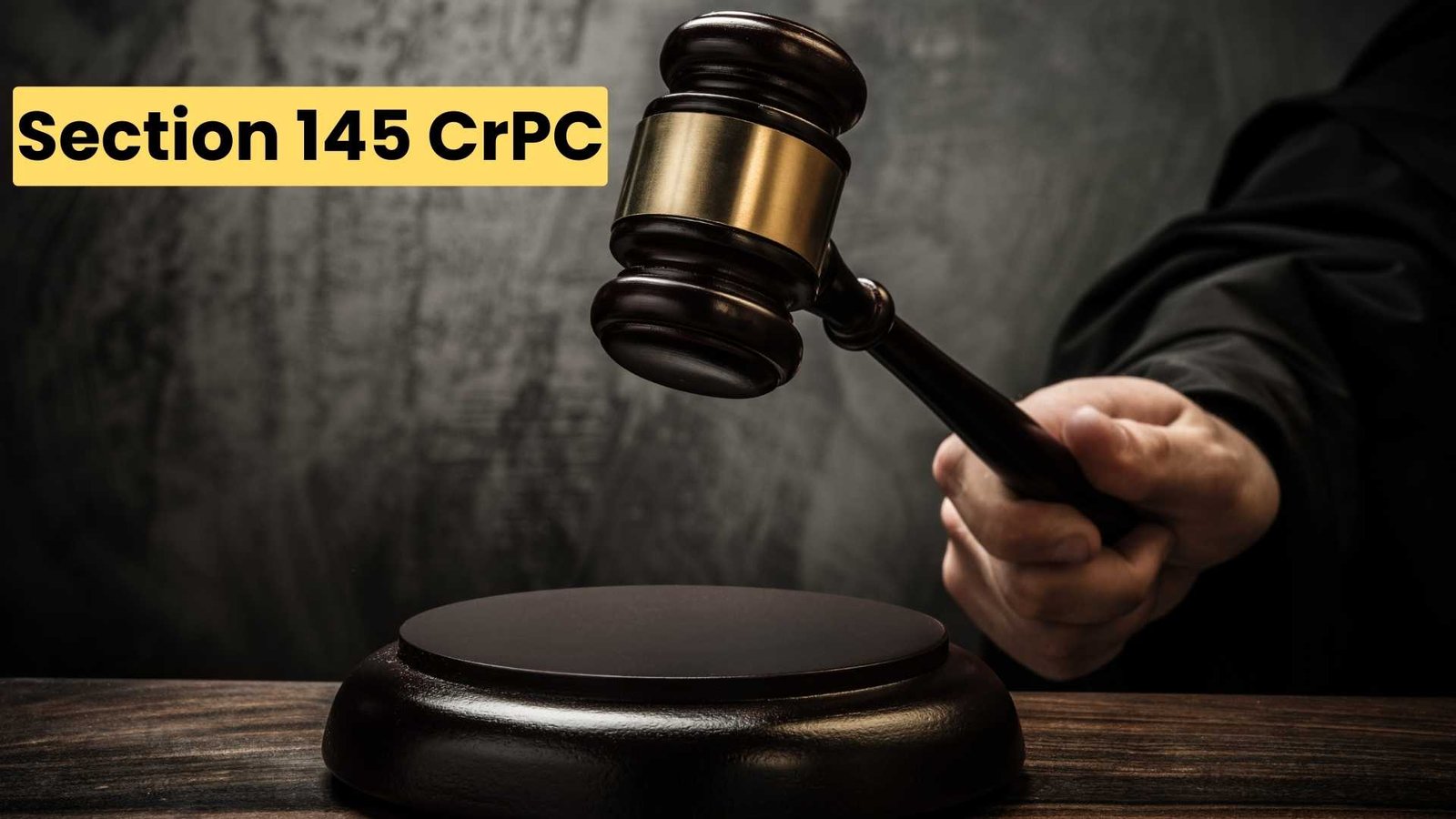On this page you will read detailed information about Section 173 CrPC.
As you navigate the complexities of the Indian criminal justice system, understanding Section 173 of the Code of Criminal Procedure (CrPC) is crucial. This pivotal provision governs the submission of police reports upon completion of investigations. Whether you’re a legal professional, law student, or simply seeking to expand your knowledge, grasping the intricacies of Section 173 CrPC is essential. This comprehensive overview will equip you with a thorough understanding of its key components, procedural requirements, and significance within the broader legal framework. By delving into this critical aspect of criminal procedure, you’ll gain valuable insights into how cases progress from investigation to trial.
What is Section 173 of the Code of Criminal Procedure (CrPC)?
Section 173 of the Code of Criminal Procedure (CrPC) is a crucial provision that outlines the requirements for police officers to submit a report upon completion of a criminal investigation. This section plays a vital role in ensuring transparency and accountability in the Indian criminal justice system.
Key Components of Section 173 CrPC
The 173 crpc mandates that every investigation must be completed without unnecessary delay. For certain sexual offenses, the investigation must be concluded within two months from the date the information was recorded. Upon completion, the officer-in-charge of the police station must forward a comprehensive report to the Magistrate empowered to take cognizance of the offense.
This report, often referred to as the “police report” or “charge sheet,” must include essential details such as:
- Names of the parties involved
- Nature of the information
- Names of persons acquainted with the case
- Whether any offense appears to have been committed and by whom
- Status of the accused (arrested, released on bond, or in custody)
- Medical examination report of the victim (for specific sexual offenses)
Magistrate’s Role and Further Investigation
Upon receiving the report, the Magistrate has several options. They can accept the report, reject it, or order further investigation under Section 156(3). Importantly, Section 173(8) allows the police to conduct additional investigation and submit supplementary reports even after the initial filing, without requiring prior permission from the Magistrate.
This provision ensures that new evidence can be uncovered and incorporated into the case, promoting a thorough and just investigative process. The Supreme Court has upheld this statutory right of the police to conduct further investigation, emphasizing its importance in serving justice.
Purpose and Scope of Section 173 CrPC
Legal Framework and Objectives
Section 173 of the Code of Criminal Procedure (CrPC) serves as a crucial component in the Indian criminal justice system, outlining the procedures for police reports upon concluding an investigation. The primary purpose of this section is to ensure a comprehensive and transparent process for submitting findings to the court. According to legal experts, Section 173 CrPC deals specifically with offenses where magistrates are empowered to take cognizance, establishing a clear link between investigative agencies and the judiciary.
Key Provisions and Requirements
Under Section 173 CrPC, investigating officers are required to submit a detailed report containing essential information about the case. This includes the names of parties involved, the nature of the information received, names of witnesses, and whether an offense appears to have been committed. The report must also indicate if the accused has been arrested or released on bond. These requirements ensure that the magistrate has a comprehensive overview of the case before proceeding further.
Flexibility for Further Investigation
One of the most significant aspects of Section 173 CrPC is its provision for further investigation. As highlighted by legal scholars, Section 173(8) allows the police to conduct additional inquiries even after submitting the initial report. This flexibility enables law enforcement to pursue new leads or evidence that may emerge during the course of the investigation, ensuring a thorough and just process. However, it’s important to note that while the police have this power, they cannot conduct a “fresh” or “de novo” investigation without the court’s permission.
Magistrate’s Role and Discretion
The magistrate plays a crucial role in the application of Section 173 CrPC. According to legal precedents, the magistrate has the discretion to accept the charge sheet, reject it, or direct further investigation if they find the initial police investigation inadequate. This oversight ensures that the investigation process remains thorough and fair, balancing the interests of justice with the rights of the accused.
Key Provisions Under Section 173 CrPC
Report Submission Requirements
Section 173 CrPC mandates that police officers submit a detailed report upon concluding an investigation. This report, often referred to as the charge sheet or final report, must be forwarded to a Magistrate empowered to take cognizance of the offense. The report should include critical details such as the names of involved parties, nature of the information, names of potential witnesses, and whether any offense appears to have been committed.
Time Constraints and Special Cases
Investigations must be completed without unnecessary delay. However, for certain offenses under the Indian Penal Code, such as those related to sexual assault, the investigation must be concluded within two months from the date the information was recorded. This provision ensures timely justice in sensitive cases.
Magistrate’s Role and Discretion
Upon receiving the report, the Magistrate plays a crucial role in determining the next steps. They have the discretion to accept the charge sheet, reject it, or direct further investigation if dissatisfied with the initial findings. This power allows for a thorough examination of the case before proceeding to trial.
Further Investigation and Supplementary Reports
An important aspect of 173 CrPC is the provision for further investigation. Even after submitting the initial report, police officers retain the right to conduct additional inquiries if new evidence emerges. This flexibility ensures that investigations remain thorough and adaptable to new information, ultimately serving the cause of justice more effectively.
In the previous post, we had shared information about Life Imprisonment in India: A Critical Evaluation, so read that post also.
Police Report Under Section 173 – Form and Contents
Key Components of the Police Report
The police report submitted under Section 173 CrPC is a crucial document that marks the conclusion of a criminal investigation. This report, also known as a charge sheet or closure report, must contain several essential elements to ensure a comprehensive overview of the case. According to legal experts, the report should include:
- Names and addresses of the parties involved, including the accused
- Nature of the offense under investigation
- Names of witnesses acquainted with the case circumstances
- Whether an offense appears to have been committed and by whom
- Status of the accused (arrested, released on bond, or in custody)
Timeline and Submission Process
The timely submission of the 173 CrPC report is critical for maintaining the integrity of the judicial process. As outlined in the Criminal Procedure Code, the investigating officer must complete the investigation without unnecessary delay. For certain offenses, such as those under IPC Sections 376 and 376A, the report must be filed within two months of recording the initial information.
Legal Implications and Judicial Discretion
The police report under Section 173 serves as a foundation for the magistrate to determine the next steps in the legal proceedings. It’s important to note that the magistrate has the discretion to:
- Accept the report and take cognizance of the offense
- Reject the report and drop the proceedings
- Direct further investigation under Section 156(3)
This discretionary power ensures that the judicial system can address any gaps in the investigation process, maintaining the balance between law enforcement and justice.
Filing of Charge-sheet Under Section 173
The Charge-sheet: A Crucial Document
The filing of a charge-sheet under Section 173 of the Code of Criminal Procedure (CrPC) marks a pivotal moment in the criminal justice process. This comprehensive document, prepared by the investigating officer, encapsulates the findings of the police investigation and serves as the foundation for initiating criminal proceedings. The 173 crpc mandates that this report be submitted to the Magistrate without unnecessary delay, typically within 60-90 days of the accused’s arrest, depending on the nature of the offense.
Essential Components of the Charge-sheet
A well-crafted charge-sheet must include several key elements to ensure its validity and effectiveness:
- Names of all parties involved in the case
- Nature of the information gathered during the investigation
- Names of persons acquainted with the circumstances of the case
- Whether any offense appears to have been committed and by whom
- Status of the accused (arrested, released on bond, or in custody)
For specific offenses, such as those under Sections 376, 376A, 376AB, 376B, 376C, 376D, 376DA, 376DB, or 376E of the Indian Penal Code, the charge-sheet must also include the medical examination report of the victim.
The Magistrate’s Role and Further Investigation
Upon receiving the charge-sheet, the Magistrate has several options:
- Accept the charge-sheet and take cognizance of the offense
- Reject the charge-sheet and drop the proceedings
- Direct further investigation under Section 156(3) if deemed necessary
It’s important to note that the filing of a charge-sheet doesn’t preclude additional investigation. Section 173(8) allows for further inquiry even after the initial report is submitted, ensuring that new evidence can be incorporated into the case as it emerges.
Supplementary Charge-sheets
Purpose and Legal Basis
Under Section 173(8) of the Code of Criminal Procedure (CrPC), law enforcement has the authority to conduct further investigations and submit supplementary charge-sheets even after the initial charge-sheet has been filed. This provision ensures that justice is served by allowing new evidence or information to be presented to the court. The primary goal of a supplementary charge-sheet is to provide the court with additional evidence, witnesses, or modifications to the charges since the filing of the initial charge-sheet.
Judicial Discretion and Procedure
The Magistrate plays a crucial role in the process of supplementary charge-sheets. They have the discretion to:
- Accept or reject the initial charge-sheet
- Order further investigation under Section 156(3) CrPC
- Consider protest petitions filed by complainants
According to legal precedents, the police have the right to conduct further investigation without prior permission from the Magistrate. However, it’s important to note that further investigation differs from re-investigation, and the principle of double jeopardy does not apply as it is a continuation of the initial investigation.
Impact on Legal Proceedings
The submission of a supplementary charge-sheet can significantly impact ongoing legal proceedings. The Supreme Court has ruled that when determining whether an accused has committed an offense, both the original charge-sheet (under Section 173(2) CrPC) and the supplementary charge-sheet must be considered jointly. This approach ensures a comprehensive analysis of all available evidence before reaching a conclusion about the accused’s culpability.
It’s crucial to note that a supplementary charge-sheet should present new evidence or material that was not properly investigated earlier. The Delhi High Court has emphasized that it should not merely be a re-appreciation of existing evidence. This requirement ensures that the 173 CrPC provision is used effectively to serve the interests of justice rather than as a tool for unnecessary delays or harassment.
Cognizance of Offense by Magistrate
Role of the Magistrate in Taking Cognizance
Upon receiving a report under Section 173 CrPC, the magistrate plays a crucial role in determining the next steps of the legal process. The magistrate has the discretion to either accept the report, order further investigation, or take cognizance of the offense. This decision-making power is an essential part of the criminal justice system, ensuring that cases are properly evaluated before proceeding to trial.
Options Available to the Magistrate
When presented with a chargesheet, the magistrate has several options:
- Accept the chargesheet and take cognizance of the offense
- Reject the chargesheet and drop the proceedings
- Direct further investigation under Section 156(3)
In cases where a final report is submitted stating no offense has been committed, the magistrate can choose to:
- Accept the final report and drop the proceedings
- Reject the final report and take cognizance of the offense
- Direct further investigation
Handling Protest Petitions
An important aspect of the magistrate’s role is dealing with protest petitions. The Supreme Court has observed that upon receiving the final police report, the magistrate has the discretion to treat a protest petition filed by the aggrieved party as a complaint case. This approach allows the magistrate to consider additional perspectives and ensure justice is served.
Magistrate’s Discretionary Power
It’s crucial to note that the magistrate is not bound by the conclusions of the investigating officer. The magistrate has the discretionary power to accept or reject the police report based on their assessment of the evidence presented. This independence allows for a thorough evaluation of each case, ensuring that the interests of justice are upheld in the cognizance process under 173 CrPC.
Remedies Against Defective Investigation
When faced with a defective investigation under Section 173 CrPC, several remedies are available to ensure justice is served. These options aim to address shortcomings and maintain the integrity of the criminal justice system.
Judicial Intervention
Courts play a crucial role in rectifying investigative deficiencies. According to the Supreme Court, constitutional courts have the power to order re-investigation or even a de novo investigation to ensure fairness, even after a trial has commenced. This remedy is particularly important in cases of gross negligence or intentional lapses.
Further Investigation
Section 173(8) of the CrPC allows for further investigation even after the submission of a charge sheet. As noted by legal experts, formal permission from the court is not necessary if the head of the police department deems it appropriate. This provision enables the collection of additional evidence to strengthen the case.
Petitioning for CBI Investigation
In cases where local police investigations are deemed inadequate, petitioners can approach the High Court to seek a CBI investigation. This remedy is particularly effective when dealing with high-profile cases or those involving influential accused parties.
Magistrate’s Oversight
The Supreme Court has affirmed that if a Magistrate believes proper investigation is not being conducted, they can direct the officer to make a proper investigation and monitor its progress. This oversight ensures that investigative lapses are addressed promptly.
By utilizing these remedies, stakeholders in the criminal justice system can work towards overcoming the challenges posed by defective investigations under 173 CrPC, ensuring a fair and just process for all parties involved.
FAQs on Section 173 CrPC
Section 173 of the Criminal Procedure Code (CrPC) deals with the police report submitted upon completion of an investigation. This crucial provision mandates that investigating officers submit a detailed report to the magistrate, outlining key aspects of the case. The report, commonly known as a charge sheet, must include information such as the names of parties involved, nature of the offense, evidence collected, and the investigating officer’s conclusions regarding prosecution.
The police report under Section 173 CrPC must contain several essential elements:
i) Details of the accused and witnesses
ii) Nature of the information received
iii) Whether any offense appears to have been committed
iv) Status of the accused (arrested, released on bail, etc.)
v) Evidence collected during the investigation
vi) Statements recorded under Section 161 CrPC
Yes, Section 173(8) CrPC allows for further investigation even after the initial report has been submitted. The police have the authority to conduct additional inquiries based on new evidence or facts that come to light. However, there has been some debate regarding whether prior permission from the magistrate is required for such investigations. Recent Supreme Court judgments have clarified that seeking the magistrate’s approval is necessary to maintain judicial oversight in the criminal justice process.
Conclusion
As you have seen, Section 173 of the Code of Criminal Procedure plays a vital role in India’s criminal justice system. This provision establishes clear guidelines for police investigations and report filing, ensuring a standardized process nationwide. By mandating thorough documentation and timely submission of findings, Section 173 promotes transparency and accountability. It serves as a crucial bridge between the investigative and judicial phases of criminal proceedings. Moving forward, a nuanced understanding of this section is essential for legal professionals, law enforcement, and citizens alike. Continued analysis and proper implementation of Section 173 CrPC will undoubtedly contribute to a more efficient and equitable criminal justice process in India.
Disclaimer
The information and services on this website are not intended to and shall not be used as legal advice. You should consult a Legal Professional for any legal or solicited advice. While we have good faith and our own independent research to every information listed on the website and do our best to ensure that the data provided is accurate. However, we do not guarantee the information provided is accurate and make no representation or warranty of any kind, express or implied, regarding the accuracy, adequacy, validity, reliability, availability, or completeness of any information on the Site. UNDER NO CIRCUMSTANCES SHALL WE HAVE ANY LIABILITY TO YOU FOR ANY LOSS OR DAMAGE OF ANY KIND INCURRED AS A RESULT OR RELIANCE ON ANY INFORMATION PROVIDED ON THE SITE. YOUR USE OF THE SITE AND YOUR RELIANCE ON ANY INFORMATION ON THE SITE IS SOLELY AT YOUR OWN RISK. Comments on this website are the sole responsibility of their writers so the accuracy, completeness, veracity, honesty, factuality and politeness of comments are not guaranteed.
So friends, today we talked about Section 173 CrPC, hope you liked our post.
If you liked the information about Section 173 CrPC, then definitely share this article with your friends.
Knowing about laws can make you feel super smart ! If you find value in the content you may consider joining our not for profit Legal Community ! You can ask unlimited questions on WhatsApp and get answers. You can DM or send your name & number to 8208309918 on WhatsApp








